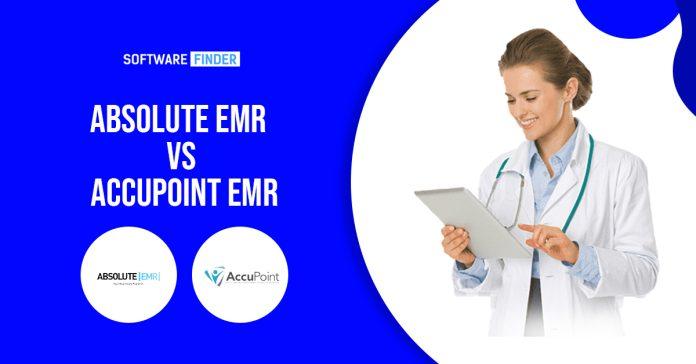Introduction:
Electronic Health Record (EHR) and Electronic Medical Record (EMR) systems play a crucial role in modern healthcare practices. These systems enhance efficiency, streamline workflows, and improve patient care. In this report, we will compare and analyze two prominent EHR and EMR solutions: Absolute EHR and AccuPoint EMR. By evaluating their features, usability, integration capabilities, and pricing, we aim to provide insights to healthcare professionals considering the adoption of such systems.
Features:
Absolute EHR: Absolute EHR offers a comprehensive set of features, including patient scheduling, medical charting, e-prescribing, billing and claims management, and reporting. It allows customization to suit different specialties and workflows, ensuring ease of use and adaptability. The system integrates with laboratory and imaging systems, facilitating efficient retrieval of test results and images.
AccuPoint EMR: AccuPoint EMR also provides a range of features such as appointment scheduling, charting, e-prescribing, billing, and reporting. It focuses primarily on behavioral health and addiction treatment practices, offering specialized templates and forms to support these specialties. The system includes built-in compliance tools to adhere to industry standards and regulations.
Usability:
Absolute EHR: Absolute EHR offers an intuitive and user-friendly interface, designed to enhance user experience. Its customizable templates and forms enable clinicians to easily document patient encounters and access relevant information quickly. The system incorporates features like drag-and-drop functionality and voice recognition for streamlined data entry. Training and support resources are readily available for efficient onboarding.
AccuPoint EMR: AccuPoint EMR also prioritizes user-friendliness with a straightforward interface and specialized workflows for behavioral health providers. It includes tools like treatment plans, progress notes, and outcome measures specific to this domain. The system’s simplicity allows for ease of use, but it may lack the same level of customization found in Absolute EHR.
Integration:
Absolute EHR: Absolute EHR offers robust integration capabilities, enabling seamless interoperability with external systems. It integrates with laboratory and imaging systems, allowing for direct access to test results and images within the EHR. The system can also interface with billing and practice management software, optimizing revenue cycle management.
AccuPoint EMR: AccuPoint EMR provides integration options, albeit with a narrower focus. It integrates with billing and revenue cycle management systems to streamline financial workflows. However, it may have limited integration capabilities with external laboratory and imaging systems.
Pricing:
Absolute EHR: Absolute EHR’s pricing model typically involves an initial implementation cost, followed by ongoing subscription fees based on the number of providers and users. The pricing structure can vary depending on the specific requirements of the practice, such as customization needs and additional modules.
AccuPoint EMR: AccuPoint EMR follows a similar pricing model, with implementation costs and ongoing subscription fees. The exact pricing details are typically provided upon request and can depend on factors such as the number of providers and users, as well as any specialized modules or services required.
Conclusion:
Both Absolute EHR and AccuPoint EMR offer valuable features and functionalities for healthcare practices. Absolute EHR provides a broader range of customization options and extensive integration capabilities, making it suitable for practices with diverse needs. On the other hand, AccuPoint EMR specializes in behavioral health practices, offering tailored templates and compliance tools specific to this domain. The choice between the two ultimately depends on the specific requirements and priorities of the healthcare organization.
It is crucial for healthcare professionals to conduct thorough research, consider their unique needs, and potentially engage in demonstrations or trials before making a final decision. By doing so, they can ensure the selected EHR or EMR system aligns with their workflow and enhances overall efficiency and patient care.
